Khamenei's Top Military Aide Claims New Era With Neighbors Has Begun

The top military adviser to Iran’s Supreme Leader Ali Khamenei says a new era of relations with neighboring countries has begun in Tehran's foreign policy.

The top military adviser to Iran’s Supreme Leader Ali Khamenei says a new era of relations with neighboring countries has begun in Tehran's foreign policy.
Addressing the First National Conference of Iran and Neighbors on Monday, Major General Yahya Rahim Safavi, who is a former chief commander of Revolutionary Guard, said finding shared interests with the neighboring countries is now necessary for peace, progress and prosperity in the region.
Safavi’s remarks came as Iran-backed Houthis in Yemen launched a missile attack against the United Arab Emirates on Monday, for second time in a week.
Tensions between Iran and Persian Gulf Arab States have been high in the past few years, as Tehran expanded its network of proxy forces in the region and backed Houthi rebels in Yemen.
Referring to Iran’s long-term agreements with China and Russia, he said that Iran’s closer cooperation with the East has surprised “Western enemies and some regional rivals.”
Safavi said signing a “20-year non-aggression pacts” with all the neighboring states can be a good start to achieve a lasting security in the region.
In a similar conference in November, Safavi had said Iran should boost its intelligence cooperation with regional countries to coordinate the exchange and analysis of strategic data.
Iran’s hardliner officials and media say a new power triangle consisting of Iran, Russia and China has formed against the United States.
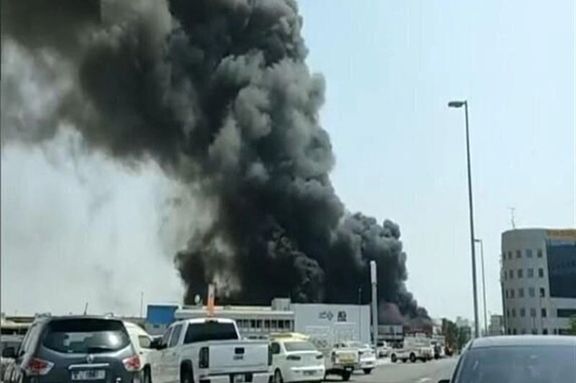
The United Arab Emirates intercepted two Houthi ballistic missiles on Monday with no casualties, its defense ministry said, following a deadly attack a week earlier.
"The remnants of the intercepted ballistic missiles fell in separate areas around Abu Dhabi," the ministry said, adding it was taking necessary protective measures against all attacks.
Iran-backed Houthis who have been battling a Saudi-led coalition that includes the UAE, have repeatedly carried out cross-border missile and drone attacks on Saudi Arabia and launched an unprecedented assault on the UAE on January 17.
UAE newspaper The National cited residents reporting flashes in the sky over the capital around 4:30 a.m.
Saudi state media early on Monday said the coalition intercepted a ballistic missile, with remnants damaging workshops and vehicles in the south of the kingdom. It said late on Sunday that a ballistic missile fell in the south, injuring two foreigners and causing damage in an industrial area.
The Yemen conflict is largely seen as a proxy war between Saudi Arabia and Iran. UAE has reduced its direct military role in the past two years.
The Saudi-led coalition has ramped up air strikes on what it describes as Houthi targets in Yemen.
At least 60 people were killed in a strike on a temporary detention center in northern Saada province on Friday.
The coalition intervened in Yemen in March 2015 months after the Houthis ousted the internationally recognized government from Sanaa.
Reporting by Reuters

China is now the single largest investor and trading partner to 11 Middle Eastern countries, thanks primarily to its Belt and Road Initiative (BRI), a global, multi-trillion-dollar project.
China has significantly increased its economic, political, and security footprint in the Middle East through the BRI during the past decade. The ‘Belt’ runs from China, through South and Central Asia, and into Europe. The Maritime “road” connects coastal Chinese cities with Africa and the Mediterranean.
The Center for Economics and Business Research (CEBR) reported that China’s Belt and Road Initiative is likely to boost world GDP by $7.1 trillion annually within the next two decades. As attractive as that might sound, in addition to economic activity, China has geopolitical motivations behind its Belt and Road Initiative.
According to The Guardian, BRI projects have left 165 countries collectively owing a massive $385 billion to China. China systematically underreports stats like this to international bodies, such as the World Bank.
The Information office of the Chinese government reports the BRI has created more than 244,000 jobs for locals overseas. However, a vast majority of BRI projects require the use of Chinese companies, labor, and raw materials, meaning the GDP gains from BRI will go to the Chinese ‘locals,’ not to the locals of the countries in which China has invested.
Energy Security of People’s Republic of China
China’s top economic agencies have singled out “security” as a priority for 2022. In other words, securing the supplies of everything from grains to energy and raw materials. According to The Brookings Institution, “China’s growing role in the Middle East is positioning the rising superpower in direct confrontation with shifting U.S. interests in the domains of energy security, Israel, and Iran.”. The US finds itself reducing its footprint in the Middle East and shifting its focus towards the Asia-Pacific, giving China the opportunity to expand its influence in the region. Chinese economic dominance may invite similar regional skirmishes as the country seems happy to leverage risky debt against the countries it invests in to get what it wants diplomatically.
China’s relationship with the Middle East revolves primarily around Energy and the BRI. The Middle East and North Africa (MENA), a collective of 19 counties, has vast oil, petroleum, and natural gas reserves, making it attractive to China.
According to China Global Investment Tracker, Beijing heavily depends on Middle Eastern oil and gas. In addition to energy security, China’s strong diplomatic ties with MENA countries are vital to implementing BRI across several continents. Chinese State-owned lenders have been financing projects in Egypt, Iran, Saudi Arabia, Oman, the United Arab Emirates, and Djibouti, where Beijing has established its only overseas military base.
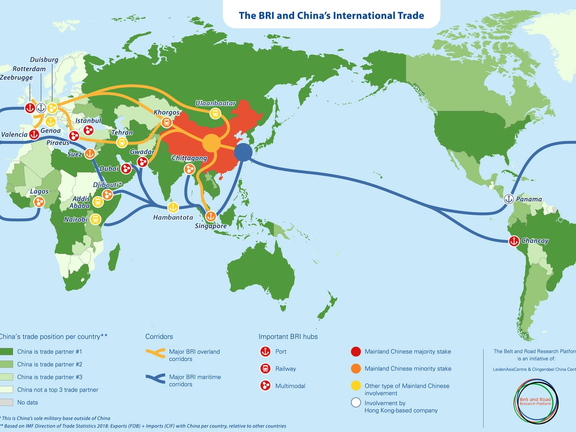
Djibouti, located in ‘The Horn of Africa’, also hosts U.S., French, and Japanese military bases. The international interest in Djibouti lies in the Bab El-Mandeb Strait, a strategic route for oil and natural gas shipments, connecting the Red Sea and the Indian Ocean. Its location makes the choke point geopolitically and economically significant.
The Energy Information Administration (EIA) reports, approximately “6.2 million barrels per day of crude oil, condensate, and refined petroleum products flowed through the Bab El-Mandeb Strait towards Europe, the United States, and Asia.” One-third of the world’s ships transporting energy and cargo must pass through the strait. Bab El-Mandeb is one among a series of trade and energy corridors in which China has invested stretching from the South China Sea to the Arabian Sea, referred to by India as a “String of Pearls.” India sees this investment as a sign of China’s growing military and trade prowess in the region. Indian critics are worried the BRI is a military initiative, aiming to give the Chinese Navy better access to the Indian Ocean.
China’s maritime “road” now stretches from western Xinjiang, through India, into the Persian Gulf. To implement BRI, China will need to achieve energy security within the Middle East, to keep its pace of development. To achieve energy security, China needs bases at every strategic port and chokepoint. As for the Gulf states’ approval of China, Iran announced the opening of a Chinese consulate in Bandar-Abbas, Iran’s most significant trading and military port on December 29th, 2021. Beijing has maintained close ties with Iran amid nuclear negotiations with the U.S. Iran recently signed a 25-year cooperation agreement with China, allowing China to invest $400 billion over 25 years in Iran. The Supreme Leader of Iran, Ayatollah Ali Khamenei, said, “The Islamic Republic will never forget China’s cooperation during the sanctions era.” It is essential to keep in mind, Iran’s cooperation with China may be a non-calculated reaction to its bad relations with the United States, and not a calculated strategic move on Teheran’s part, for its long-term development and international trade.Sorely needed economic injection investee countries like Iran, will receive from China, position China to earn favorable diplomatic preference throughout the developing regions through which BRI is implemented.
Debt-Trap-Diplomacy or Investee’s Incompetence?
China has been accused of strategically ensnaring investees with “debt-trap- diplomacy.” Unsustainable debt and the constrictive terms of Chinese loans have come under increased scrutiny in recent years, as more countries sign deals with China’s state-owned lenders. Concerns have centered particularly around some clauses that allow Chinese entities to seize property or assets when payments can’t be met. This has prompted worries of seizures of land or other assets, or debts that leave governments beholden to Beijing.
MI6 chief Richard Moore warned the BBC that China’s approach to loans often incorporates debt and data traps, which threaten to “erode sovereignty and have prompted defensive measures.”To vividly illustrate what Chinese debt traps look like in practice, observe the cases of Sri Lanka, Kyrgyzstan, and Montenegro, which are all falling short on their loan obligations to China, which refuses them self-sustainable growth.
Sri Lanka is currently experiencing a financial crisis from debts owed to China for highways, ports, airports, and a coal power plant. Sri Lanka’s President, Gotabaya Rajapaksa, has requested that China consider restructuring Sri Lanka’s debt repayments. According to Reuters, over the last decade, China has lent Sri Lanka over $5 billion.” Critics say China uses white elephant projects with low returns, which China has denied.
Similarly, Kyrgyzstan owes 40% of its foreign debt, $1.8 billion, to Chinese lenders. They grapple with repayments and meeting deadlines as the country faces financial troubles brought on by the COVID-19 pandemic.
In Montenegro, worries flared up after the government requested help from the European Union (EU) to pay off a $1 billion Chinese loan for a controversial, ongoing highway project. Montenegro’s economy is on the verge of derailment as a result: Montenegro’s debt has climbed to 100% of its GDP due to this project.What’s worse, “once completed, the road won't lead anywhere anyway. We make a joke: It is ahighway from nothing to nothing," says the country's former Justice Minister, Dragan Soc. The EU’s refusal to help Montenegro to pay its debt is an opportunity for China to grow its influence and foothold in Europe. Scott Morris, a senior fellow at the Center for Global Development says, “China is the top lender in the world, so it matters how it approaches these contracts.” Morris continues, “the general conclusion after looking at the contracts is that Chinese entities are issuing loans with the full intention of getting their money back.” China seems equally happy to swap debt for rights, ownership, and influence when the prospect of financial repayment becomes bleak for investees.
The ‘Non-Interference’ Policy, a False Sense of Security
China is using a ‘Non-interference’foreign policy, to differentiate its approach from the US, creating a false sense of security, as the very nature of BRI is invasive. China’s ’Non-interference’ policy, combined with the implementation of the BRI’s opaque contracts, creates opportunities for China to prevent having to take accountability for its actions abroad, similarly to how it’s already doing so domestically.
China needs the GCC’s approval to gain energy security in the region. Chinese Foreign Ministry spokesperson, Wang Wenbin said the Gulf Cooperation Council (GCC) Secretary-General, Nayef Falah Al-Hajraf, expressed firm support for China’s “legitimate positions on issues related to Taiwan, Xinjiang and human rights,” when the GCC members met with Chinese officials in Beijing early January of 2022. Wang continued to say they have expressed opposition to “politicization of human rights issues.”
United Nations revealed in 2018, that China has detained more than a million Muslim Uyghurs in the Xinjiang region as part of a campaign to wipe out their traditional culture, language, and beliefs. Al-Hajraf’s support of China’s detainment of Uyghurs, on behalf of the GCC—a body representing more than 54 million Muslims—sets an unsettling precedent for the way those populations may get treated in MENA countries through which the BRI extends.
China’s ‘Non-Interference’ foreign policy seems to be gaining attraction among authoritarian countries with stagnant economies; one being Iran. The Iran-China 25-year Cooperation Agreement is signed at a time when Iran is politically and economically isolated, which could have affected the terms of the agreement. The BRI’s record of economy-crippling projects in countries with economies stronger than Iran’s means that Iran may have a difficult 25 years ahead.
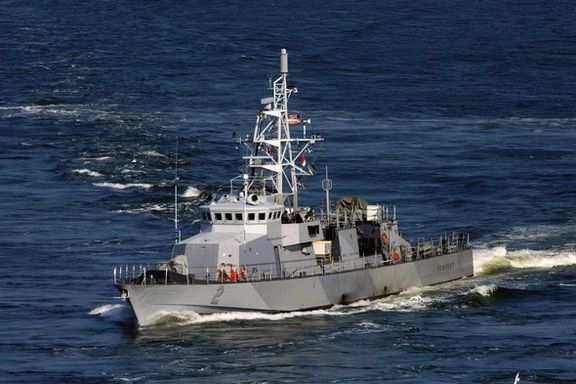
The US 5th Fleet interdicted a stateless fishing vessel in the Gulf of Oman carrying 40 tons of urea fertilizer that can also be used to make explosives.
“Guided-missile destroyer USS Cole (DDG 67) and patrol coastal ship USS Chinook (PC 9) interdicted the stateless vessel transiting from Iran in waters outside of any state’s territorial sea along a route historically used to traffic weapons to the Houthis in Yemen,” a statement by the 5th Fleet said on Sunday.
The same vessel was caught in February 2021 smuggling illicit weapons off the coast of Somalia apparently for Houthi rebels in Yemen, but it is not clear how the vessel was allowed to go free.
The interdiction took place on January 18, the 5th Fleet said, and the ship was transferred to Yemen’s coastguard with its cargo and crew of five.
In December, the US Navy seized another shipin the Arabian Sea originating from Iran that was carrying 1,400 AK-47 assault rifles and 226,600 rounds of ammunition. The vessel was transiting “international waters along a route historically used to traffic weapons to the Houthis in Yemen,” a Navy statement said at the time.
The 5th Fleet operates in the waters of the Middle East, from the Red Sea to the Persian Gulf in an area encompassing 2.5 million square miles.
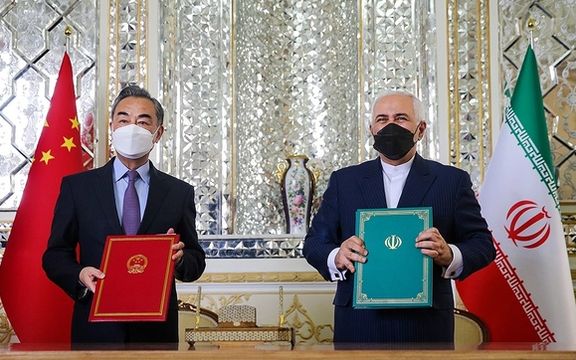
Several clerics and politicians in Iran have criticized the aura of secrecy surrounding Tehran's long-term deals with Russia and China as colonial in nature.
As criticism of President Ebrahim Raisi's recent visit to Russia continues, critics say that Iran has become a "Colony for China and Russia.” Hardliner daily Kayhan, affiliated with the office of Supreme Leader Ali Khamenei has accused the critics of "Affiliation with the United States."
On Saturday, January 22, Ayatollah Seyyed Hossein Mousavi Tabrizi, Iran's first ever Judiciary Chief, said an interview with reformist daily Arman that "Russia is not trustworthy. The Islamic Republic has been forced to signing long-term agreements with China and Russia because of international isolation."
Mousavi Tabrizi reiterated that because of its enmity with other countries Tehran has been forced to enter into deals with the two countries, adding that if it gives up its hostile approach, then it will not need such contracts. Meanwhile, he called on the government to publish the text of these agreements.
In another development, responding to questions about why Iranians have been kept in the dark, a clerical member of the presidium of the Iranian parliament (Majles), Alireza Salimi and another prominent lawmaker Mojtaba Zolnouri said that the Iranian government is not interested in disclosing the details of these deals.
In the meantime, Former President Mahmoud Ahmadinejad said in an interview with a Turkish TV network that secret agreements do not serve the nation's interest, adding that these deals will not be valid if they are not put to vote in the Iranian parliament.
In yet another example of opposition to secret deals, Mohammad Zare-Foumani, a young cleric who is the managing editor of proreform newspaper Sedaye Eslahat (Voice of Reforms), said at a gathering of Iranian political parties on Thursday: "Iran has become a colony of China and Russia, the two countries that have destroyed Iran's economy." Founmani also called for the publication of the full text of the long-term contracts with China and Russia.
The document with China was signed last March by the foreign ministers of Iran and China but its contents remain confidential. Ali Rabiei, the spokesman for the Rouhani administration had said in late March 2021 that the Iranian government has no problem with disclosing the details of its contracts, "but the Chines have a different view about this."
On Friday, Yaqub Rezazadeh, a member of the Iranian parliament's National Security and Foreign Policy Committee said that the reason for keeping the deals secret is that Iran does not want Western countries to find out about the details and use them to obstruct Iran's progress.
The Kayhan newspaper has said that the critics are individuals who dream about a secular pro-Western government in Iran, adding that the United States is counting on these individuals.
Last week, during a visit to China, Foreign Minister Hossein Amir-Abdollahian said that the implementation of the 25-year contract with China has started. China acknowledged this one day later.
IRGC-linked news agency IRGC-affiliated Tasnim harshly criticized Amir-Abdollahian's statement about Iran's decision to have balanced ties with East and West and ruled out anything other than reliance on China and Russia. On Friday, some prayer Imams, particularly in Isfahan and Rasht, praised Russia and China in such an exaggerated way that according to Asr Iran website, "even China and Russia have never claimed to be that good!"
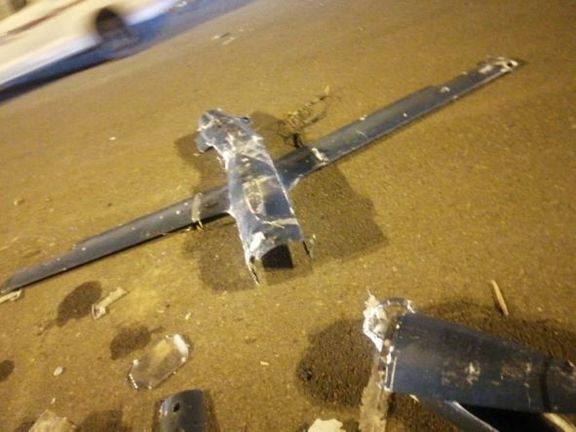
The UN Security Council on Friday stromgly condemned "the heinous terrorist attacks” in the UAE on Monday and in other sites in Saudi Arabia by the Houthis.
The council underlined the need to hold perpetrators “accountable and bring them to justice.”
Lana Nusseibeh, UAE's ambassador to the U.N., lauded the council for speaking “with one voice" and said the Houthi “terrorist attack is a clear threat to the entire international community.”
On Friday, a Saudi-led coalition airstrike hit a prison run by Yemen's Houthi rebels, killing at least 70 detainees and wounding dozens, a rebel minister said.
The strike was part of a pounding aerial offensive that hours earlier knocked the Arab world's poorest country off the internet.
The intense campaign comes after the Iran-backed Houthis claimed a drone and missile attack that struck inside the capital of the United Arab Emirates earlier in the week.
It marked a major escalation in the conflict, a brutal civil war in Yemen where the Saudi-led coalition, backed by the UAE, has battled the rebels since 2015.
Asked about Friday’s deadly coalition airstrike on the Saada prison, Nusseibeh referred to the coalition but also added that the alliance does everything to “abide by international law and proportionate response in all its military operations.”
Report by AP